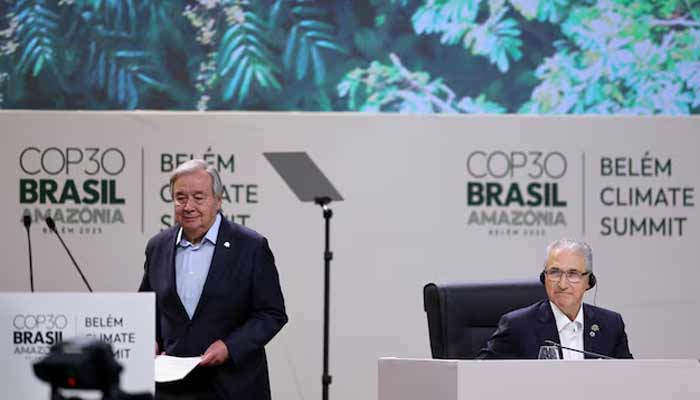Politics
COP30 climate summit set for last-gasp showdown over fossil fuels and finance

The COP30 climate summit was headed for a showdown on Friday over the future of fossil fuels after hosts Brazil dropped efforts to develop a global plan to shift away from oil, gas and coal from its proposed deal.
A draft text for a deal for this year’s UN climate summit, released before dawn on Friday, contained no reference to fossil fuels, dropping entirely a range of options on the subject that had been included in an earlier version.
The issue has been one of the most contentious at the two-week conference of nearly 200 governments in Brazil’s Amazon city of Belem.
A group of more than 30 nations sent a letter to the COP30 presidency late on Thursday saying they could not accept a deal which failed to include a commitment to develop a roadmap to transition away from fossil fuels.
That has set the stage for a showdown in the final hours of the conference, which is scheduled to end at 1800 local time (2100 GMT). Previous COP summits have blown past their deadlines before eventually reaching a compromise.
“We are disappointed with the text currently on the table,” EU climate commissioner Wopke Hoekstra said in a statement, adding it lacked ambition on action to cut emissions.
Countries are set to air their thoughts on the draft in a public plenary session starting around 1300 GMT. The deal text, which is still subject to further negotiation, would need approval by consensus in order to be adopted.
Arguments centre on fossil fuel roadmap
For days, nations have wrangled over the future of fossil fuels, whose burning emits greenhouse gases that are by far the largest contributor to global warming.
Dozens of nations have been pushing hard for a “roadmap” laying out how countries should follow through with a promise made at COP28 two years ago to move away from fossil fuels.
Saudi Arabia and other oil-producing nations are opposing this, negotiators at COP30 told Reuters. The Saudi government communications office did not immediately respond to an emailed request for comment.
A negotiator from one developing country told Reuters its government did not oppose a fossil fuel phase-out and was open to negotiating, but was concerned the draft text offered little to address their concerns on other issues including finance.
“You can’t keep saying that things that matter to us are no longer important and that things that matter to the developed countries are the only things that are important,” the negotiator said.
The letter from those supporting a roadmap – who include Colombia, France, Germany, Kenya, the Marshall Islands, Mexico, the Netherlands, South Korea, Spain and Britain – said the draft deal, in its current form, “does not meet the minimum conditions required for a credible COP outcome”.
“We cannot support an outcome that does not include a roadmap for implementing a just, orderly, and equitable transition away from fossil fuels,” the letter said.
Climate finance and trade
The draft called for global efforts to triple the financing available to help nations adapt to climate change by 2030, from 2025 levels.
However, it did not specify whether this money would be provided directly by wealthy nations, or other sources including development banks or the private sector.
That may disappoint poorer nations who want stronger guarantees that public money will be spent on this area.
Investments in adaptation — such as improving infrastructure to cope with extreme heat, or reinforcing buildings against worsening storms — are often vital for saving lives but offers little financial return, making it difficult for such investments to attract private finance.
The draft deal would also launch a “dialogue” at upcoming COP climate summits on trade, involving governments and other actors including the World Trade Organisation (WTO).
That would be a win for countries including China who have long demanded that trade concerns be part of the world’s climate summit. But it may be uncomfortable for the European Union, as demands for such discussions have often focused on the EU carbon border levy. South Africa and India have criticised the levy and argued for it to be scrapped.